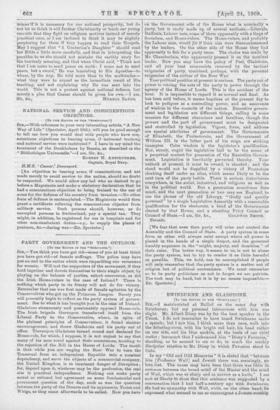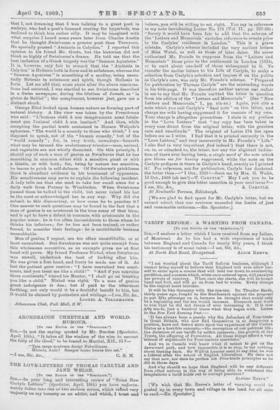fiWINBTTRi■TE AND GLADSTONt.
[To nit iFIDITOTt OM TOP "SPICOPAT014.] 8tn,—I matriculated at Balliol on the same day with Swinburne; bilt my personal intercom*, with him was slight. Mr. A.lhart Dicey was by far the best speaker in the Union. I do not remember to have heard Swinburne Make a speech ; but I saw him, I think more than once, walk into the debating-room, with his bright red hair, his head rather on one side, and his blue necktie, at the heels of our chief orator ; insomuch that I nicknamed him "Dicey'S Favonius," standing, as he seemed to me to do, in much the meekly discipular relation to Mr. Dicey in Which Faimnius stood to Cato. • In my "Old and Odd Memories" it is stated that "between him [Professor Wall] and Jowett there was, seemingly, no love Iota. The cause may have been that there was little in coalmen between the broad mind Of the Master and the Mind of Wall, which was as sharp and as narrow as a knife." I tun noW la liberty tb ititte that this sentence *as suggested y a conversation that I had lialf-a-century ago with Swinburcie. He bad no sympathy with Wall, while, on the other hand, be expressed what seemed to Me so extravagant a JoWebt-wokehip
that I, not dreaming that I was talking to t great poet in embryo, who had a poet's licensed orairing for hyperbole, was inclined to think him rather silly. It may be imagined with what surprise I beard some years later from Charles Austin that he thought Swinburne a greater poet than Tennyson. He specially praised "Atalanta in Calydon." I reported this Opinion to his friend Mr. Grote, but the historian did not think so highly of Swinburne's drama. He told me that the best imitation of a Greek tragedy was the "Samson Agonistes." It is, however, only fair to remark that the "Atalanta in Calydon" is Hellenic both in form and in substance, whereas the "Samson Agonistes " is something of a medley, being essen- tially Hebraic in substance and spirit, though Hellenic in form. Let me add that, some years after the above conversa- tions had occurred, I was startled to see Swiuburne described in a Swiss newspaper, during the lifetime of Jowett, as "in gloire de Balliol" ; the compliment, however jast, gave me a distinct shock.
George Eliot looked upon human nature as forming part of natural history. A like view was taken by the Frenchman who said : "L'homme °belt A, son temperament aunt fatale- ment que l'animal obeit A, son instinct." And thus, while accepting the partial truth contained in Horace Walpole's aphorism, "The world is a comedy to those who think," I am disposed to speak, not of the "human comedy," but of the "world comedy " ; for, in very truth, nowadays—beneath what may be termed the evolutionary tricolor—man, animal, and vegetable are not wholly disunited. On this principle, I should say of such a man of geniutS as Swinburne that he has something in common either with a sensitive plant or with , a thistle, or with both; for, being by nature too sensitive, be learns to prick in self-defence. Of Swinburne's prickliness there is abundant evidence in his treatment of opponents. His sensitiveness may serve to explain the following incident. A lady tells me that she used to take her small niece for a daily walk from Putney to Wimbledon. When Swinburne .passed them he talked to the child, but never raised his bat to the aunt or acknowledged her in any way. Why did she submit to this discourtesy, or how came he to practise it? One answer to such questions may be found in the fact that a man of genius is an aristocrat in the true sense of that term, and is apt to have a defect in Common with aristocrats in the popular sense: he is too often inconsiderate to those whom be thinks his inferiors; for he has not been trained, or rather forced, to consider their feelings : he is unelabbable because unsnubbable.
Men of genius, I repeat, are too often unstinbbajble, or at least unsnubbed. But Swinburne was not quite exeniPt from this wholesome corrective, as an example given me at first hand will prove. My friend Professor Nichol, when Swinburne was unwell, undertook the task of looking after him. He was given a free hand, and freely he made use of it. At last the patient grew restive : "I have convulsed two conti- nents, and you treat me like a child!" "And if you oonvulee three continents," roared his Mentor, "I shall g6 o treatilig you like a child." Nichol was right. To a man of genius great indulgence is due; but if paid to the uttermost farthing, not only Would it be a doubtful benefit to hitn, btit it would be claimed by poetasters and wit1ings.—I am, Sir, &a., LIONEL A. TOLLEMICIIE.
Athenwum Club, Pall Mall, S. W.























































 Previous page
Previous page